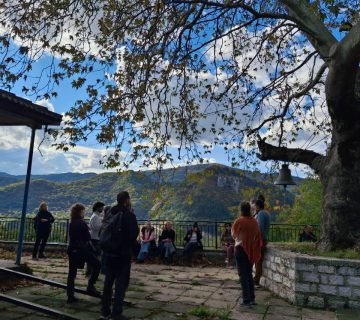A review of a recent IE webinar, highlighting its relevance to our profession and future preservation of our shared culture.
When I think of the night sky as heritage, Vincent van Gogh’s Starry Night immediately comes to mind. Its swirling heavens are more than art — they carry emotion, spirituality, and even science.
Recent studies suggest Van Gogh’s brushstrokes mirror the mathematics of turbulence, discovered decades later. For me, this shows why the night sky matters: it is emotional, cultural, and scientific at once. It provokes wonder, raises questions, and connects us with something larger than ourselves. That is exactly what heritage interpretation can do with dark skies today — transform something we take for granted into meaning and value.
I recently joined the webinar How can we preserve the natural night sky as our heritage and create meaningful connection with it? by Etta Dannemann, founder of Visit Dark Skies, and Kirsi Hyvaerinen, a leader in sustainable tourism. Organised as part of Interpret Europe’s regular webinar programme and open to members for free as well as to non-members for a fee, the webinar highlighted ways regions and tourism hosts can protect the night sky by creating and promoting guided stargazing experiences, especially in areas where darkness still prevails.
These experiences not only reconnect visitors with nature but also offer a meaningful alternative in tourism — one that raises awareness of light pollution while celebrating a vanishing treasure.
What stood out for me
The night sky is more than a natural resource. It is also intangible cultural heritage. For centuries, people created myths, calendars, and navigation systems by observing the stars. Losing access to a starry sky means losing part of this shared human story.
I see clear opportunities for heritage interpretation:
- Storytelling under the stars — linking constellations to local myths and traditions.
- Gamified experiences — quests, riddles, and cultural games inspired by the night sky.
- Educational programmes — combining science, sustainability, and cultural meaning for schools and team-building.
- Festivals and events — celebrating dark skies as both natural and cultural heritage.
Key strategies from the webinar
With light pollution increasing by almost 10% per year worldwide, preserving dark skies has never been more urgent. The speakers emphasised:
- Developing ready-to-use activities — stargazing that is accessible, weather-proof, and leaves lasting impressions.
- Focusing on remote areas — where light pollution is low and the night sky is an underused cultural and natural asset.
- Promoting ecotourism — using stargazing to create engaging experiences that benefit local hosts and the environment.
- Encouraging connection — helping visitors reconnect with nature, with the planet, and with themselves.
Why it matters now
On a personal level, this resonates strongly. In Macedonia lies Kokino, a Bronze Age archaeoastronomical site and proposed ancient observatory. Through its stone markers, people once observed celestial phenomena vital for agriculture and ritual life.
Kokino reminds us that looking at the sky has always been more than curiosity. It was a way to survive, to organise society, and to connect with the cosmos. Linking such sites with today’s interpretive practices underlines that dark skies are not only natural heritage, but also cultural legacy.
The stars are still above us. Through interpretation, storytelling, and creative experiences, we can bring them back into our lives — ensuring they remain a source of wonder and inspiration for generations to come.
Dive in! – All IE webinars are free for members to attend and you can access all the recordings of previous webinars from the members’ area of the website: https://members.interpret-europe.net/login/
Vasilka Dimitrovska is an IE certified interpretive trainer. She is director of HAEMUS – Center for Scientific Research and Promotion of Culture, and founder of Storytelling Skopje and Storytelling Macedonia. She can be contacted at: dimitrovska@haemus.org.mk.
Dimitrovska, Vasilka (2025) ‘Dark skies as heritage’ in Interpret Europe Newsletter 3-2025, p. 8.
Available online: Newsletter autumn 2025




